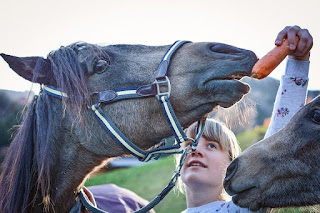How to Feed and Breed Horses

Horses are herbivores and primarily exhibit intestinal fermentation. Therefore, it is very important to implement proper nutritional management for horses to avoid over- and undernutrition. The most important aspects of nutrition are highlighted. 1. Do not give non-nitrogen proteins such as urea to horses of all classes, as these cannot be digested as ruminants. Horses must have a dry matter content of at least 1.5% of body weight. 3. Body weight (kg) = heart size (cm) * 2.7 for light varieties Body weight (kg) = heart size (cm) * 3.1 for medium varieties Body weight (kg) = kernel size (cm) * 3.5 for heavy species 4. The most common concentrates for horses are oats, barley, chickpeas and wheat bran. 5. For green fodder, the best fodder is alfalfa (green or grass). 6. For better absorption and absorption of nutrients, the total daily dose can be divided into 4-6 separate meals. 7. Feeding regularity, avoidance of complete feeds before and after training and gradual change of dose c...





